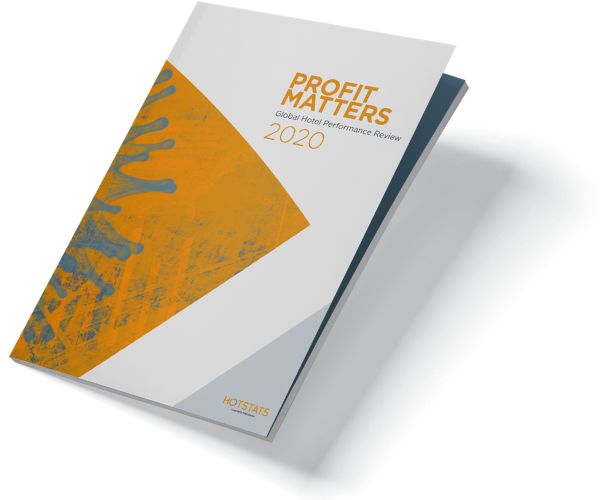This year’s report by Hotstats highlights the trends and stories that shaped 2020—from labor restructuring and breaking even to rethinking F&B and changing business channels. Beyond HotStats’ own analysis, the report features commentary from a cross-section of the hotel industry, including Hyatt Hotels Corp., Host Hotels & Resorts, Aimbridge Hospitality and HAMA Europe.

Foreword
2020 will go down as the most difficult year on record for the global hotel industry—until the next one. Which is to say that there is an inevitability of something beyond anyone’s control impacting travel and hospitality, testing its resiliency.
COVID-19 was the black swan event the hotel industry often alludes to and hopes to perpetually avoid. In an act of defiance, 2020 went rogue. The start of the new decade was one to forget and remember. Antithetical, sure, but a reminder that preparedness is about lessons learned through difficulty. And if ever there was a year of upheaval, it was 2020.
The first shocks came in February when Asia performance plummeted. The hotel industry calved like a glacier from then on, shedding revenue and profit as case counts mounted and demand deflated. Hotels overnight went from serving guests to survival mode.
But the global hotel industry has never been one to throw in the towel. The initial blow was hard, but like a seasoned prizefighter, the hotel industry is working its way off the mat. And like a plucky pugilist, it’s now fighting its way back into the match—week by week, month by month. A review of 2020 industry performance is akin to watching a horror film: It’s frightening and at turns silly. Almost every measurement HotStats tracks fell as much as or more than 50% year over-year, both on the revenue and expense sides of the ledger. Context matters and in the course of tracking the recovery, year-over-year comps just don’t cut it. The rebound will be measured incrementally, on a month-to-month basis, and across the entire profit-and-loss spectrum.
In years past, our annual “Profit Matters” tracker assessed the performance of an assortment of global cities across revenue, expense and profit. Unless you subscribe to masochism, the anomaly that was 2020 renders that normal evaluation pointless. Instead of cataloguing individual cities, we decided to take a different tack. This year, each section hits on the trends, data and subjects that mattered most to hoteliers. We accomplished it in association with some of our industry partners, who offered an “on-the-ground” recreation.
The subsequent chapters follow a format that mimics the hotel industry’s choppy ride in the wake of COVID-19. Hotels were faced with the decision to either close or stay open as occupancy dwindled. That choice ultimately led to operators and asset managers running break-even analyses to figure out at what occupancy a hotel can run to be profit neutral. The loss in revenue impacted this examination; so, too, did costs. One of the first steps hoteliers took was to reduce their expense exposure, from labor to supplies, in order to limit their losses. One of the silver linings to the pandemic will be a heralded carryover of these efficiencies into the post-pandemic rebound. Hotels are rethinking how to run leaner, smarter by reassessing the use of space and how things like rejigging food and beverage service can lead to a stronger bottom line.
All of this is dependent on demand coming back and that is contingent on the return of corporate and group travel. Though leisure travel, especially outside core, urban markets and within resort locations, has given some succor to hotels, until companies and groups return to the travel fold with gusto, the hotel industry will bounce along the bottom of the profitability curve.
Where the industry is headed is better than where it has been. Time will tell how soon it arrives, but one thing is certain: the hotel industry isn’t checking out. And the data don’t lie.
Link to download:
Download